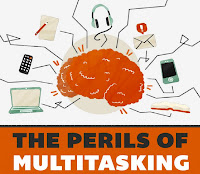Monday, 03 December 2018
The Perils of Multitasking
The
Speaking Tree | Lifestyle | ET
By Swami Dhyan Vismay
 When
we observe silently, we notice only those activities we have control over. This
is conscious energy with which we function consciously. Unconscious energy
operates in inner body organs and is not noticeable. Unconscious energy is
common to all living beings, as we are all connected to the cosmos through
breathing. Animals, birds and plants breathe as we do without any control over
this.
When
we observe silently, we notice only those activities we have control over. This
is conscious energy with which we function consciously. Unconscious energy
operates in inner body organs and is not noticeable. Unconscious energy is
common to all living beings, as we are all connected to the cosmos through
breathing. Animals, birds and plants breathe as we do without any control over
this.
So,
the pool of unconscious energy is common and we are given our share
rhythmically, as determined by the beautiful but chaotic rules of the cosmos.
We don’t breathe, the cosmos breathes for us.
When
your conscious energy is multitasking, it requires more energy than can be
supplied fully by the conscious domain. If we are awake and fully alert, we do
not stress the conscious self. If multitasking is continued in the long run, it
can lead to anumber of ailments. Meditation is a good way to overcome all this
stress.
DISCLAIMER
: Views expressed above are the author's own.
Qoute from true Charm and power of Vedanta
Hinduism and Advaita
The Speaking Tree | Lifestyle | ET
By Pavan K Varma
Hinduism,
for most within its fold, is a way of life. It has no one Pope, no one text, no
inflexibly prescriptive ritual, no mandatory congregation, and no one presiding
temple. It is for this reason that it has continued to flourish from time
immemorial, Sanatan and anant, because what is ubiquitous but not constrained
by the brittleness of form, is by definition imperishable.
But
it is precisely for this reason, too, that most Hindus, while practising their
faith in their own way, are often largely uninformed about the remarkable
philosophical foundation of their religion.
If
Hindus are adrift from the deep philosophical moorings of the religion they
practise, they are deliberately choosing the shell for the great treasure that
lies within. When religions are largely reduced to rituals, there is always the
danger that the form will become more important then the substance.
That,
I believe, will be a great disservice to Hinduism itself, and to the great
seers and sages and thinkers — to whom the book I have authored, titled ‘Adi
Shankaracharya: Hinduism’s Greatest Thinker’ is humbly dedicated — who gave to
this sanatan dharma some of the most profound philosophical insights the world
has seen. Jagat Guru Adi Shankaracharya was, undoubtedly, one of the greatest
minds in Hinduism’s unrelenting quest for the ultimate truth. His short life of
but 32 years is as fascinating as the Advaita philosophy that he so
meticulously crafted.…
DISCLAIMER
: Views expressed above are the author's own.
But, if He exists?
I
drive joy There was a doctor in Benaras who spent 7 minutes in the morning and
evening for mediation on God. Knowing this, his colleagues and friends laughed
at him. One day they argued that he was wasting ten precious minutes on
something, which he had been misled into believing. The doctor replied, “Well,
if God does not exist, I agree that I am wasting ten minutes a day. But, if He
exists? I am afraid you are wasting your entire lifetime. I prefer to waste ten
minutes rather than a lifetime. Why should you grudge me the 10 minutes joy
that I derive 4m.
ILLUSTRATED
REVIEW : 7th Heaven moment of the week , in
hockey world cup Nither land scored 7 goals,









No comments:
Post a Comment